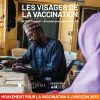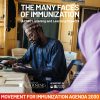IA2030
-
Making connections: Ghana’s Alumni of The Geneva Learning Foundation meet in Accra
The Geneva Learning Foundation (TGLF) will host its first physical-world meeting of Ghana Scholars and Alumni on Wednesday, October 30, 2024 in Accra. Seventy-two health professionals from across Ghana’s health system will participate in the evening event. The participants include staff from the Ghana Health Service, teaching hospitals, district health directorates, and non-governmental organizations. They…
Written by

-
7 take-aways from Nigeria’s first Immunization Collaborative peer learning exercise
On August 6, 2024, the Nigeria Immunization Agenda 2030 Collaborative concluded its first peer learning exercise with a final Assembly. This groundbreaking initiative, a partnership between The Geneva Learning Foundation, Nigeria’s National Primary Health Care Development Agency (NPHCDA), and UNICEF, has already engaged over 4,400 health workers from all 36 States and more than 300…
Written by

-
Experience-sharing sessions in the Movement for Immunization Agenda 2030: A novel approach to localize global health collaboration
As immunization programs worldwide struggle to recover from pandemic disruptions, the Movement for Immunization Agenda 2030 (IA2030) offers a novel, practitioner-led approach to accelerate progress towards global vaccination goals. From March to June 2022, the Geneva Learning Foundation (TGLF) conducted the first Full Learning Cycle (FLC) of the Movement for IA2030, engaging 6,185 health professionals…
Written by

-
Semaine mondiale de la vaccination: Que voyez-vous?
English version | Version française Ceci est la préface de la nouvelle publication Les visages de la vaccination. En savoir plus… Télécharger la collection… Chaque jour, des milliers d’agents de santé, de l’Afghanistan au Zimbabwe, se lèvent et se rendent au travail avec un seul objectif en tête : faire en sorte que les vaccins parviennent…
Written by

-
World Immunization Week: What do you see?
English version | Version française This is the preface of the new publication The many faces of immunization. Learn more… Download the collection… Every day, thousands of health workers, from Afghanistan to Zimbabwe, get up and go to work with a single goal in mind to ensure that vaccines reach those who need them. To…
Written by

-
Gender analysis of the World Health Organization online learning program on Immunization Agenda 2030
The article “Gender analysis of the World Health Organization online learning program on Immunization Agenda 2030” is, according to the authors, “the first to showcase the positive inclusion of mainstreaming gender in a WHO capacity-building program.” Context: Key findings: This is consistent with the known effectiveness of peer feedback, as the rubric followed by each…
Written by

-
Movement for Immunization Agenda 2030 (IA2030): grounding action in local realities to reach the unreached
Three years after the launch of Immunization Agenda 2030 (IA2030), WHO’s 154th Executive Board meeting provided a sobering picture of how the COVID-19 pandemic reversed decades of progress in expanding global immunization coverage and controlling vaccine-preventable diseases. In response, the World Health Organization is calling for action “grounded in local realities”. Growing evidence supports fresh…
Written by

-
Widening inequities: Immunization Agenda 2030 remains “off-track”
The WHO Director General’s report to the 154th session of the Executive Board on progress towards the Immunization Agenda 2030 (IA2030) goals paints a “sobering picture” of uneven global recovery since COVID-19. As of 2022, 3 out of 7 main impact indicators remain “off-track”, including numbers of zero-dose children, future deaths averted through vaccination, and…
Written by

-
Movement for Immunization Agenda 2030 (IA2030): National EPI leaders from 31 countries share experience of HPV vaccination
What difference can peer-led learning and action make for national EPI planners seeking new strategies to support HPV vaccine introduction or reintroduction? The stakes are high: HPV vaccination efforts, if successful, will avert 3.4 million deaths by 2030. On Friday, EPI focal points for HPV and other national-level MOH colleagues from 31 countries convened under…
Written by

